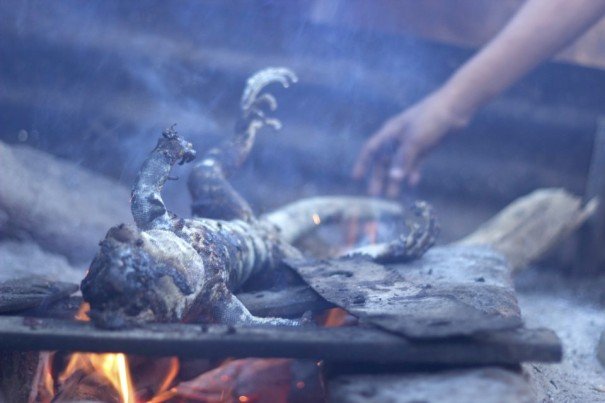
Cold Blood for a Warm Belly

Cold Blood for a Warm Belly
Some say it tastes like chicken. Other argue rabbit. Still more say fish. Iguana is not a traditional Nicaraguan breakfast dish nor is it legal to hunt this time of year but in the name of God, vitality and an invigorated prostate, it seems there are no rules.
It’s early afternoon when a rapid knock happens upon my door.
“An iguana,” Alejandro says between heaves, gesturing wildly, his bike tipped over in a mess of metal at his feet. “They caught one and they are waiting for you.”
Two days prior I had accompanied local boys and their grandfather, a sage iguana hunter, up Volcán Concepción to a place where iguana caverns mark the slope. We were unlucky, or I should say, an iguana was lucky. The dogs were slow to hunt that day and we were too loud; the kids laughing at me and my unsteady feet, falling plenty as the muddy path turned into a vertical beach.
While Iguana hunting is illegal from January to April (to observe the breeding time), there are cultural cravings that aren’t so easily curbed. Easter is when the populace’s hankering for iguana peaks. No beef for reasons of fasting, so iguana meat will have to do. Among many tales from old wives, in Nicaraguan culinary mysticism, iguana is hailed as an energy enhancer, a life rejuvenator and, oh yeah, an aphrodisiac too.
I arrive at a house with weathered concrete walls and a roof that looks like diced ceramic planters. An iguana hunter’s castle, if I ever did see one. I’m led to a smoke shack where rib-bearing puppies and a kitten sit outside the doors, gaze fixed on the thing that’s smoking inside. From the innards of the shack, I hear a small, sweet voice speaking with contradicting authority; the animals scatter. The calls of “fuera!” come from little Juan who is turning an iguana in the fire, its curled feet catching the light like a wish. Juan’s bare hand, for lack of a spit, clutches the iguana’s smoking tale and flames wrap the reptile’s torso as it’s flipped on its belly. Smoke fills the room and I imagine its cold blood turning warm.
Juan takes the iguana onto a bench where he scrapes at its skin, tenderizing the meat. His grandfather arrives. The hunter’s machete is like a third arm. He takes hold of the iguana and in one fell swoop, guts it and proudly shows me inside. A toothless grin fills his face as the sour smell of half-cooked intestines fills the cook house, overpowering the smoke. I smile back and take a photo for want of gagging and the hunter hangs the smoldering carcass over the wall.
He tells me we’ll eat the iguana in the morning. Night falls and I lay in bed awake, the smell of roasted guts caught in my nose.
The next morning, there’s a clang of a falling bicycle and familiar hurried knock on my door. Ten minutes later, I find myself at the hunter’s home. He and his grandsons sit around a stump in the early morning light. A plate of iguana meat, bones and who knows what waits for me along with plantains and gallo pinto, a traditional breakfast accompaniment of rice and beans.
I sit down and feel the Mona Lisa smile of faces following my hand while pretending not to look. I pick up my fork. They watch as I chew, searching my face for an answer. The meat is greasy and tender and almost sweet.
I swallow. “It tastes like fish.”